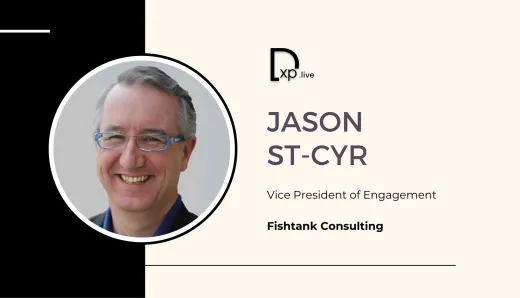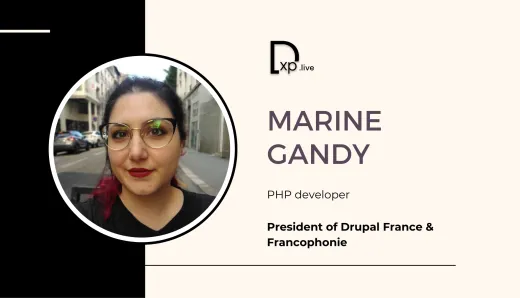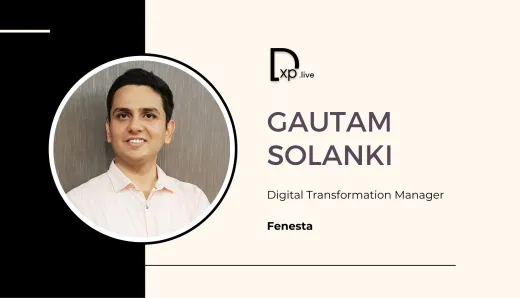Nicolas Loye on Building a Future-Ready Drupal Ecosystem
How Strategic Architecture and Community-Driven Leadership Are Shaping Drupal's Future and Empowering Global Growth
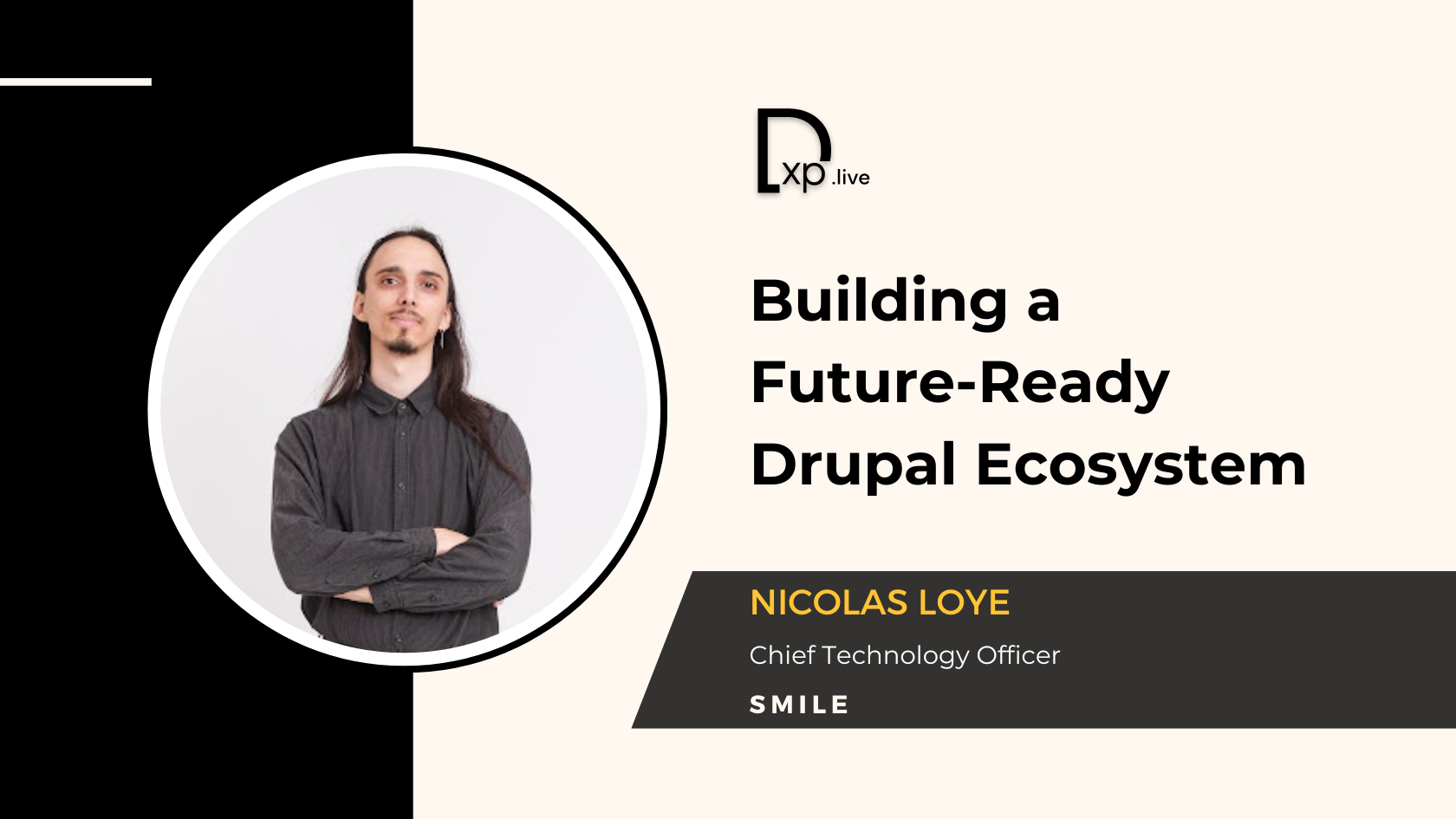
Nicolas Loye is a seasoned Drupal expert with over 16 years of experience in the community, having started his journey with Drupal in 2006. As the Chief Technology Officer at Smile, Nicolas has played a pivotal role in driving innovation and excellence in web architecture, specializing in Drupal and its integration with modern technologies like headless CMS and microservices. Throughout his career, Nicolas has actively contributed to the Drupal community, speaking at major events such as DrupalCon and Drupal Dev Days. His expertise extends to organizing key Drupal events, including Drupalcamps and the Drupal Global Contribution Weekend. He is a co-maintainer of several Drupal modules, including the FormSteps module, and is deeply involved in the security advisory process.
In addition to his role at Smile, Nicolas serves as the Treasurer of Drupal France & Francophonie, where he continues to contribute to the growth and development of the Drupal ecosystem in the French-speaking community. He is recognized for his commitment to improving Drupal’s security, scalability, and performance, and for his leadership in organizing and contributing to large-scale Drupal events across Europe.
Nicolas's passion for Drupal is fueled by the strong relationships he has built within the community, which he considers an integral part of his personal and professional life. His contributions span over a decade, and he continues to be an influential figure in both the Drupal and broader web development communities.
INTRODUCTION
In this interview, we sit down with Nicolas Loye, Smile's Chief Technology Officer and renowned Drupal expert. With over 16 years of experience, Nicolas has been instrumental in driving Drupal's evolution, particularly through his work on web architecture and integration of modern technologies.
In this conversation, Nicolas shares his insights on the ever-evolving nature of Drupal, his approach to integrating modern technologies like headless CMS and AI into the platform, and the ethical considerations that come with using cutting-edge tools like large language models. He also reflects on the deep sense of community that has kept him passionate about Drupal over the years, and how he prioritizes features and security in the projects he maintains. Whether you’re a Drupal developer or a business leader exploring the possibilities of the platform, Nicolas’s expertise and dedication to Drupal offer valuable perspectives on the future of web development.
With over 16 years of experience in the Drupal community, how have you seen the platform evolve, particularly in terms of large-scale web architectures? What major changes do you believe have had the most significant impact on developers and businesses alike?
Nicolas: Over the years, there have been countless changes in Drupal, but if I had to highlight three key ones, I'd say the first was during the release of Drupal 7. With this version, we standardized how entities were structured, moving away from relying on the CCK (Content Construction Kit) module. This allowed users to add fields directly to content elements in a more standardized and flexible way, giving businesses the ability to customize their content much more efficiently.
The second major change was the launch of the localized initiative. We introduced a translation server, localized.drupal.org, which made translating Drupal applications much easier. I'm still part of the Drupal 10 port initiative today, and this change has had a massive impact on making Drupal accessible to global users, making it easier for businesses to deploy multilingual websites without extensive technical hurdles.
The third significant change is more community-oriented but tied to a technical shift—the adoption of Symfony components with Drupal 8. This transition professionalized our development processes, bringing more engineering rigor to Drupal. However, it also meant that we lost some contributors who were more comfortable with the simpler, non-object-oriented approach of earlier Drupal versions. By moving to Symfony, we raised the technical bar, making Drupal more suitable for larger and more complex enterprise-level projects.
"For developers, these changes have been pivotal. Standardizing content structure with Drupal 7 made the platform more flexible, and the Symfony integration in Drupal 8 elevated the skill level required for development. From a business perspective, the move to Symfony and more professionalized tools meant a change in the kinds of clients we could serve".
For example, Drupal 7 allowed for cheaper, quicker projects with smaller clients, while Drupal 8 demanded more skilled developers, raising development costs. This increased complexity has been a challenge for smaller projects but brought tremendous value for larger, enterprise-level clients who need scalable, secure, and well-architected solutions. Overall, businesses now benefit from a more robust and future-proof platform, though it comes at a higher cost.
These changes have been significant for both developers and businesses. For developers, the shift to more professionalized tools and frameworks like Symfony raised the level of expertise required. This caused some to leave the community, due to the complexity of projects. For businesses, this professionalization meant a shift in client base and project costs. Drupal 8, for instance, required more skilled developers, leading to increased development costs compared to Drupal 7. However, this also translated into more robust, scalable, and enterprise-grade solutions for clients, ultimately benefiting businesses with more reliable and maintainable web architectures.
You've maintained various Drupal modules (module documentation), such as the 'Forms Steps' module. How do you prioritize which features to develop or maintain in your projects?
Nicolas: FormSteps is a project that I started from scratch with some colleagues, driven by the needs we had in my previous company. When you're the creator of a module, it's often easier to prioritize because you are directly using it. In the case of FormSteps, I developed it to solve specific challenges I encountered, so my initial priority was always ensuring it met those needs.
As for general prioritization, my main approach is to consider the impact a feature or bug has on users. If a bug arises that affects a large number of users or significantly disrupts their workflows, it becomes a top priority. For example, in FormSteps, there have been some blockers that completely prevented people from using the module efficiently. When I see that users can’t proceed because of a critical issue, I know that fixing it immediately is essential.
Similarly, when developing new features, I think about how beneficial they will be for the broader community. Sometimes, a small feature can have a large impact on a project’s usability, and that’s where I focus my energy. Ultimately, I try to prioritize based on the module's ability to solve real problems for its users.
Security is a crucial aspect of any CMS. Can you elaborate on your experience with Drupal's security advisory coverage, and how do you ensure that your projects are compliant with the latest security standards?
Nicolas: Security is one of my key focus areas, and Drupal has an excellent security team. My experience with the Security Advisory policy started when I submitted the FormSteps module for review. To be part of the Security Advisory program, you need to submit your project for a comprehensive review, where the team checks for potential vulnerabilities. Before I even submitted FormSteps, I had already conducted automated and manual security reviews because, at the time, I was working heavily on security in my company. This allowed me to proactively identify and fix any security issues.
"Drupal’s centralized code structure on drupal.org is one of the reasons why it’s such a secure CMS. Unlike other CMS platforms, where plugins can be decentralized and come from a wide range of sources, Drupal maintains all modules and plugins in a centralized location. This makes security reviews much easier and more effective, as the community can ensure that all code is held to the same standards".
I’ve done presentations and talks on Drupal security, and it's a topic I am deeply passionate about. While I’m not a cybersecurity expert, I have enough knowledge in the field to recognize and address security risks in Drupal. I believe Drupal is probably the most secure CMS out there, especially because of our organized approach and the community’s commitment to security.
For businesses and developers alike, the security model in Drupal is robust. We work closely with security teams from other CMS platforms as well, such as WordPress, to share knowledge and improve the overall security landscape. This collaborative effort makes Drupal an incredibly safe choice for enterprise-level websites.
With DrupalCon Barcelona 2024 coming up, what are you most excited about? How do you think this event will shape the future of Drupal in Europe and globally?
Nicolas: This year’s DrupalCon is particularly exciting for several reasons. First, we have the Starshot initiative that brings Drupal CMS, which is a major focus. It aims to significantly improve the user experience, making Drupal more accessible to non-technical users. This shift is crucial as we continue to evolve from a developer-focused platform to one that embraces a broader audience. It's going to help Drupal appeal to more people, beyond just developers.
Another big moment is the final farewell to Drupal 7. Drupal 7 has been a staple for many businesses and organizations for years, and while it’s a bittersweet goodbye, it’s also a chance for the community to fully embrace newer, more modern versions of Drupal. Saying goodbye to Drupal 7 means we can shift our full attention to the future—building on the strengths of Drupal 8 and 9 and pushing forward with Drupal 10 and beyond.
There are, of course, concerns about the community shrinking, especially given the financial difficulties many organizations are facing, which has led to fewer contributors and participants in the community. But despite these challenges, I believe we’re moving in the right direction. By focusing on accessibility and making Drupal easier for non-technical users, we’re opening doors for more people to contribute and participate, which is essential for Drupal’s growth globally.
At the same time, strengthening the community remains key. DrupalCon is a unique opportunity to connect, share knowledge, and empower each other. We’ll see a lot of innovation and discussions around making Drupal more flexible, scalable, and user-friendly, which will shape not only the future of the platform in Europe but also its global presence. Overall, I’m excited to see how this event will drive collaboration and help us continue expanding Drupal’s impact across industries and regions.
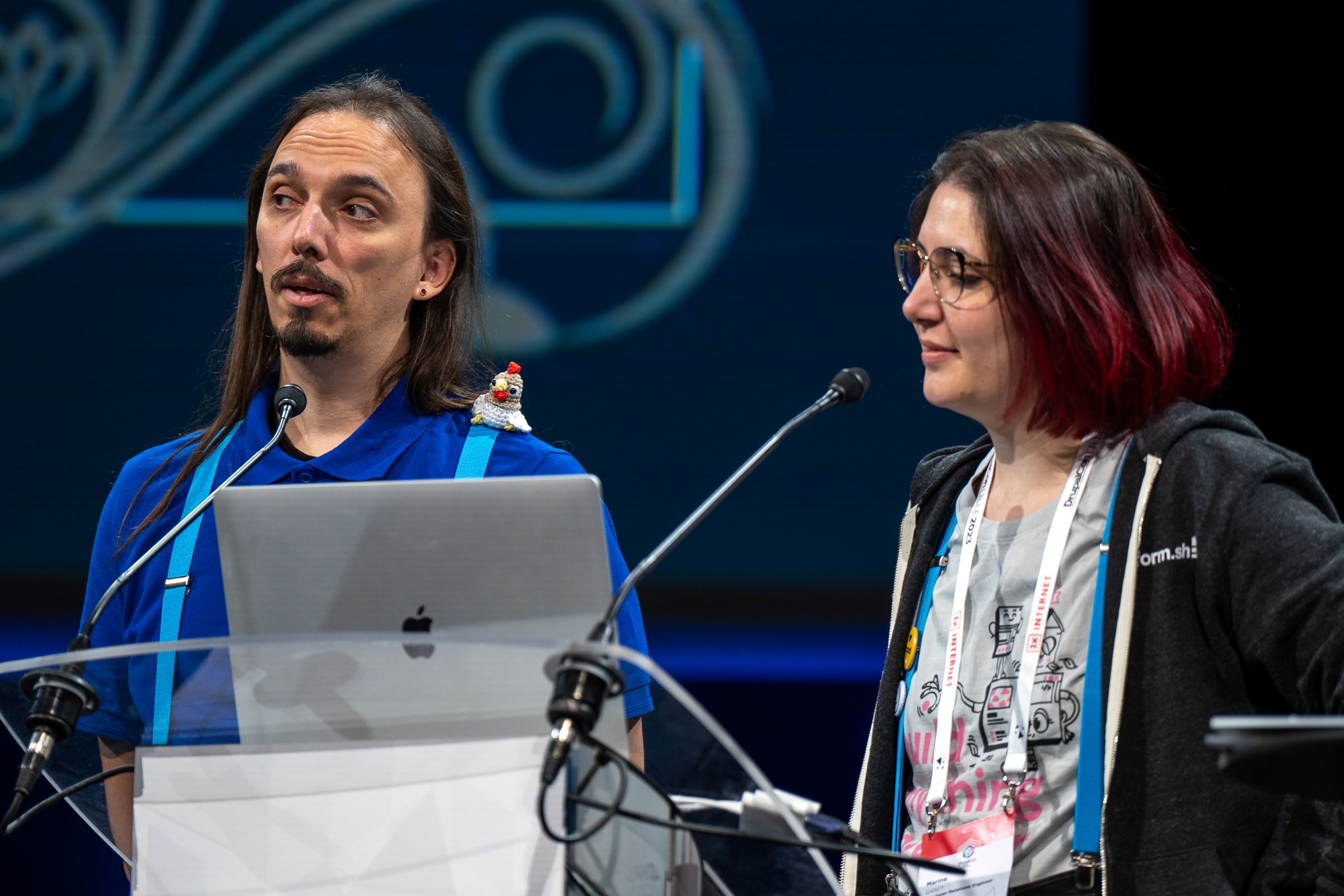
As the Co-Chair of the Marketing & Outreach Committee for DrupalCon Barcelona 2024, could you share some key marketing strategies you're implementing to ensure DrupalCon Barcelona not only attracts a diverse audience but also amplifies its impact on the future of Drupal?
Nicolas: One of our main strategies is working closely with different groups in the Drupal community, particularly those developing future features. For example, we’re collaborating with the Drupal Starshot marketing committee to ensure we communicate about this initiative using the right tone and messaging. Our focus is not just on the tools and features themselves but on the people behind them. I firmly believe that the real value of Drupal is in its community—people come for the code, but they stay for the community. We need to consistently highlight the human element because, at the end of the day, it’s the people who create and drive innovation.
We're also welcoming new volunteers into the committee to bring fresh ideas and perspectives. For example, this year, we brought on someone new, Prevya, who has been contributing a lot of enthusiasm and creativity. This aligns with our overall goal of fostering diversity in the committee, both in terms of people and ideas.
As for the formats we’re using, we’re always asking ourselves how to best communicate with the community. Traditional blog posts and social media remain important, but we're experimenting with new formats, such as video content, to engage a wider, more diverse audience. We’re regularly evaluating where the community is active and figuring out how to meet them where they are. This includes exploring platforms like Instagram and Mastodon, even though our presence on these platforms is still growing. The idea is to be where the community is, rather than trying to be everywhere.
This year has been a bit of a transitional period, as the leadership within the marketing committee has shifted. Despite that, we're making efforts to ensure we stay connected with the community and amplify the impact of DrupalCon by encouraging new voices and leveraging various communication channels. We’re working hard to reach more people and build excitement around the event, not just through social media, but also by fostering genuine connections within the community.
Generative AI is transforming many aspects of technology, including web development. How do you see AI, particularly Large Language Models (LLMs), being integrated into the Drupal community and projects? What are the potential benefits and ethical considerations that developers should be mindful of as they explore these technologies?
Nicolas: Generative AI, especially Large Language Models (LLMs), is making waves across multiple industries, and I see its integration into Drupal projects becoming more common as the technology matures. AI can enhance many areas of web development, particularly in automating content generation, improving personalized user experiences, and even helping with code assistance for developers. In Drupal, LLMs can be used to streamline content workflows by auto-generating content or recommendations based on user behavior, enabling sites to offer dynamic, personalized experiences at scale.
That said, I approach the use of AI with a degree of caution. There are clear benefits—AI can help speed up development tasks, automate routine processes, and handle a large portion of coding. However, it’s not a silver bullet. Based on my experience, while AI can generate 60-80% of usable code, it still requires human oversight to refine and complete. The human factor is essential because, despite the growing sophistication of AI, there are still gaps in understanding and context that machines can’t fully grasp. Developers need to make sure the output aligns with the project’s goals and is error-free.
Now, when we talk about ethical considerations, this is where things get serious.
"One major concern is copyright and data privacy. LLMs are often trained on massive datasets, but the question arises—do those training datasets include copyrighted material or personal data without permission? This can lead to significant legal and ethical dilemmas. Another issue is the human labor behind AI—many LLMs are trained or moderated by people who are often exposed to harmful content. This is something developers need to be aware of as they choose AI models for their projects".
AI also raises questions about transparency and fairness. There’s a risk that AI models could perpetuate biases present in the data they are trained on, leading to unintended consequences in the way websites function or the experiences they offer to users. As Drupal developers, we need to be particularly mindful of these biases and ensure that the technology we deploy is as unbiased and fair as possible.
Ultimately, I see AI as a powerful tool for Drupal, but one that requires careful consideration. Developers should explore AI’s potential while being fully aware of the ethical implications, ensuring that its use benefits users without compromising on privacy, fairness, or human dignity. AI can certainly improve the Drupal ecosystem, but it should always be applied with a human-centered approach, especially when considering the end-user experience.
Given your expertise in Webfactory and Drupal architectures, how do you approach the integration of Drupal with other technologies, such as headless CMS or microservices architecture?
Nicolas: I approach the integration of Drupal with headless CMS and microservices architecture with a lot of caution and careful consideration. While these technologies offer substantial benefits, like improved scalability, flexibility, and the ability to deliver content across multiple platforms, they also come with challenges that can’t be overlooked.
For instance, adopting a headless architecture means separating the front-end and back-end, which gives developers more control over the user experience but also adds complexity. You suddenly have multiple moving parts that need to be maintained and integrated, and this requires a broader set of skills from your development team. You’re no longer just working with Drupal; you also need front-end developers who are skilled in JavaScript frameworks like React or Vue.js. This can drive up costs because it requires more specialized developers, and it also increases the complexity of the project.
Similarly, microservices architecture offers great flexibility by allowing you to decouple different parts of the system into independent services. This enables teams to work on different parts of the application simultaneously and deploy updates without affecting the entire system. However, it also means that you need to have a solid infrastructure in place to manage communication between services, handle data consistency, and ensure the overall system remains performant and secure. It’s not a decision to be taken lightly because it can complicate the development process and lead to increased operational overhead.
Before recommending a headless CMS or microservices approach, I always ask, "Why are we doing this?" It’s important to evaluate whether the client’s business needs truly warrant these architectures or if they’re just chasing a trend. Just because something is trendy doesn’t mean it’s the right solution for every project. You need to weigh the benefits against the added complexity, costs, and maintenance requirements. For some clients, a traditional monolithic Drupal setup might be more cost-effective and easier to manage in the long run.
In my experience, when integrating Drupal with other technologies, the key is to ensure that the architecture serves the client’s goals and improves the end-user experience. It’s always about finding the right balance—making sure that the technology works for the client and not the other way around.
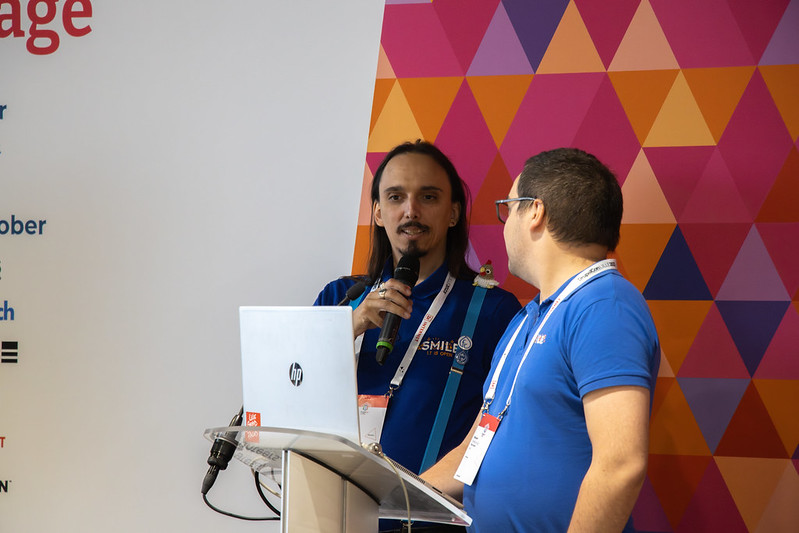
Finally, what drives your passion for Drupal after all these years, and what keeps you motivated to continue contributing and leading within the community?
Nicolas: Drupal has become like family to me. When I first started in the community, I was just a quiet developer, not very talkative, but over time, I’ve met so many wonderful people who made me feel welcomed and valued. The friendships I've built—both in the international Drupal community and within the French Drupal community—have become incredibly important to me. These relationships go beyond just work or coding; they’re about being part of something larger, a supportive network of people who share the same values.
I always say this, but if you know anyone who needs empowerment and wants to be part of something greater, introduce them to the Drupal community. It’s not just about building websites—it's about empowering people.
"What keeps me passionate about Drupal is this sense of belonging and personal connection. Drupal isn't just a platform or a tool for me anymore—it's part of my life. It’s the people and the community that motivate me to keep contributing and leading within this space. Whether it's organizing events or collaborating on projects, I feel a deep sense of purpose being part of this ecosystem. Even beyond the technical side of things, Drupal is about empowering people, and that's something I’m truly passionate about".
I think another aspect that drives my passion is how Drupal continues to evolve. The platform is always pushing forward, innovating, and adapting to new trends in technology. Seeing the community come together to solve challenges, create new features, and improve the platform year after year gives me immense satisfaction. It's not just about the technology but about contributing to something that has a real, lasting impact on businesses, developers, and end users.
Drupal has given me so much, both professionally and personally, and that’s why I’m still passionate about it. It’s a big part of my life, and I’ll continue to be involved because it continues to give me value and purpose.


